The Original ‘Star Trek’ Cast: Where They’ve Boldly Gone, Then and Now
You may have caught the classic sci-fi series Star Trek during its original run in the mid-1960s or, if not, then you caught it in reruns throughout the 1970s or '80s. But whenever it was that you discovered the starship Enterprise and its crew, it seems pretty impossible to believe you could have imagined it still being part of the popular conversation nearly 60 years after it made its debut. Or, even more incredibly, that one of the Star Trek cast members would actually make his way into space.
(Click through to our sister site to learn behind-the-scenes secrets of the original Star Trek.)
The original Star Trek series made … well, stars out of its cast, who must have been just as amazed as the audience to find their lives and careers intersecting repeatedly following the show's cancellation in 1969. They first reunited for 1973 to 1974's Saturday morning Star Trek: The Animated Series, and went on to appear in six movie adventures between 1979's Star Trek: The Motion Picture and 1991's Star Trek VI: The Undiscovered Country.
What follows is a look at those beloved actors in the Star Trek cast between and beyond their journeys to the final frontier.
William Shatner as Captain James T. Kirk
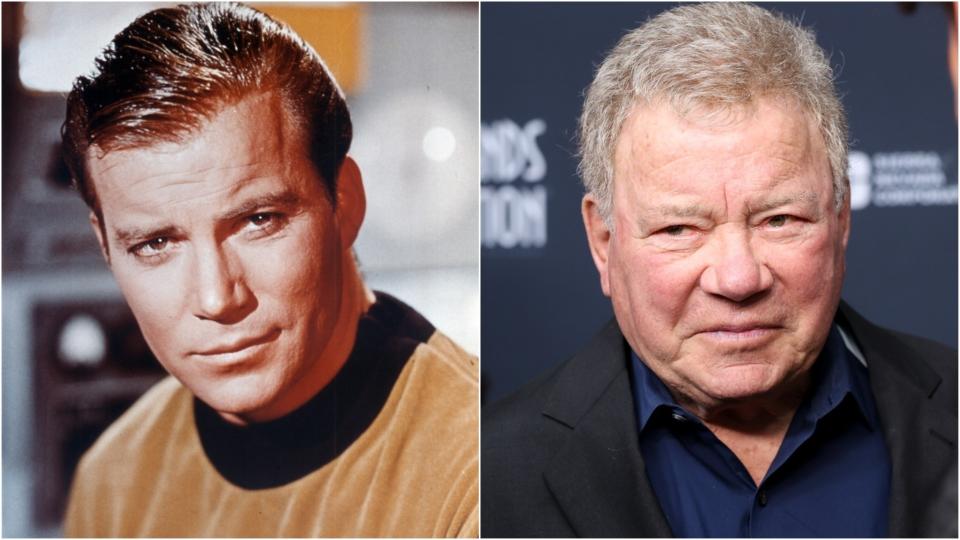
Coming from a background that included acclaimed roles on stage (The World of Suzie Wong, A Shot in the Dark), screen (The Brothers Karamazov, Judgment at Nuremberg) and television (The Twilight Zone, The Outer Limits, For the People), William Shatner was deemed the right man to captain the starship Enterprise and he did so brilliantly. But when the show ended in 1969, things weren't so easy, and although he starred in the short-lived series The Barbary Coast, he had to pay the bills by participating on game shows, guest starring on different TV series, starring in low budget movies and appearing in TV and radio commercials.
A lifeline was thrown to him in the form of 1979's Star Trek: The Motion Picture, the success of which essentially relaunched his career.
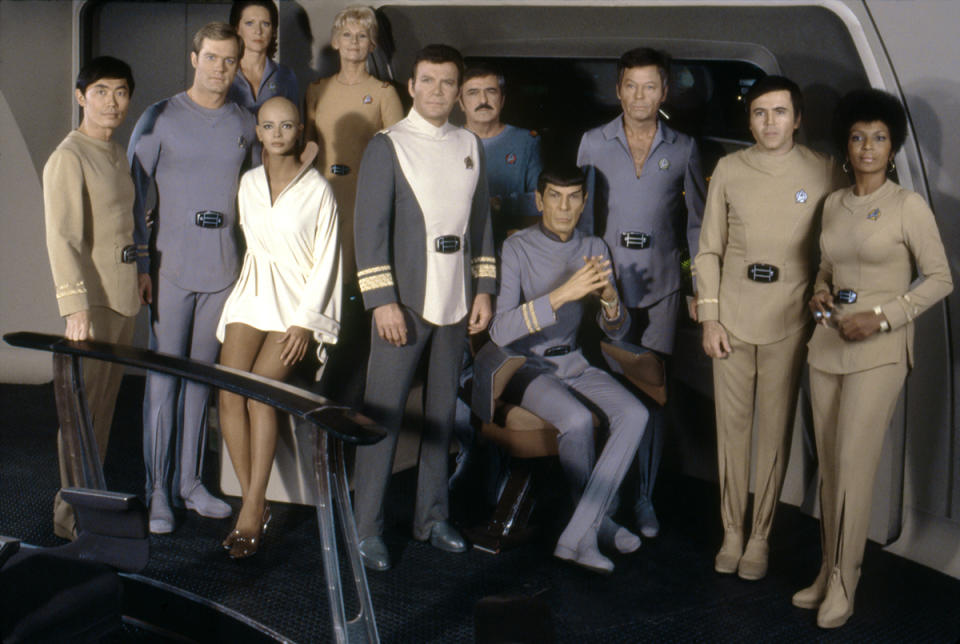
Not only would Shatner star in six other films in the franchise, but he was featured in the title role of the police drama T.J. Hooker (1982 to 1986), hosted Rescue 911 (1989 to 1996), produced and starred in the TekWar series (1994 to 1996) — based on his own science fiction book series under the same umbrella title — achieved critical acclaim and an Emmy for Outstanding Supporting Actor in a Drama Series for his role as Denny Crane in Boston Legal (2004 to 2008), performed a one-man show on Broadway, narrated countless documentaries and TV specials, recorded albums, and authored a couple of dozen fiction and non-fiction books.
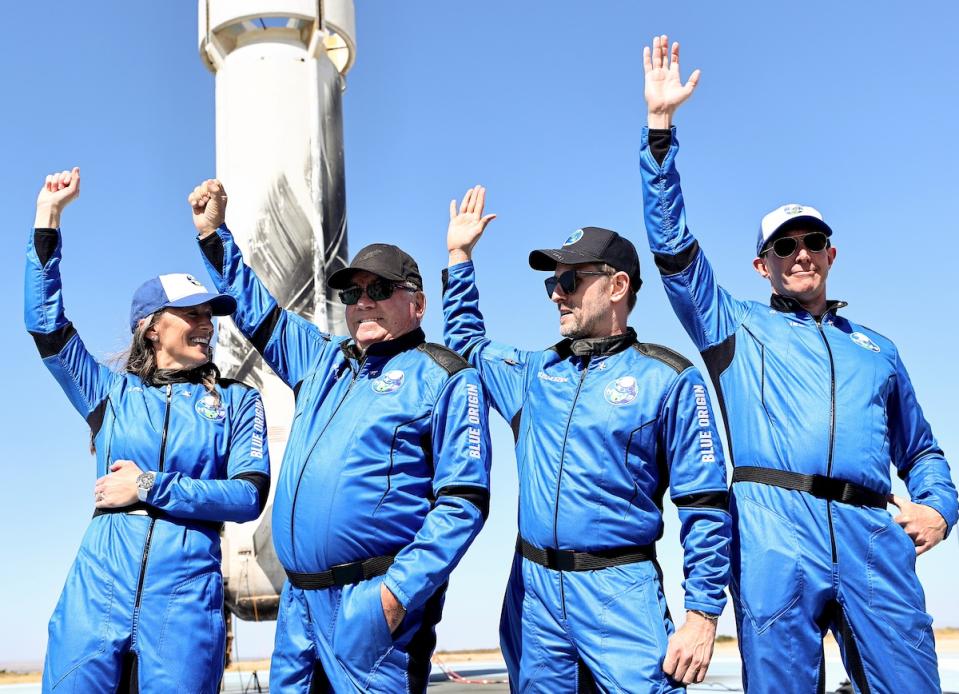
Oh, and in 2021 he became the oldest person to go into space, doing so aboard the Blue Origin NS-18. For fans of Star Trek it was a a thrill, but for Shatner himself the response was not one that would have expected.
"This was an immensely powerful awakening for me," he said on stage at a convention. "It filled me with sadness. I realized that we had spent decades, if not centuries, being obsessed with looking away, with looking outside. I did my share in popularizing the idea that space was the final frontier. But I had to get to space to understand that Earth is and will stay our only home. And that we have been ravaging it, relentlessly, making it uninhabitable."
Again, not what one would have expected.
Leonard Nimoy as Mr. Spock
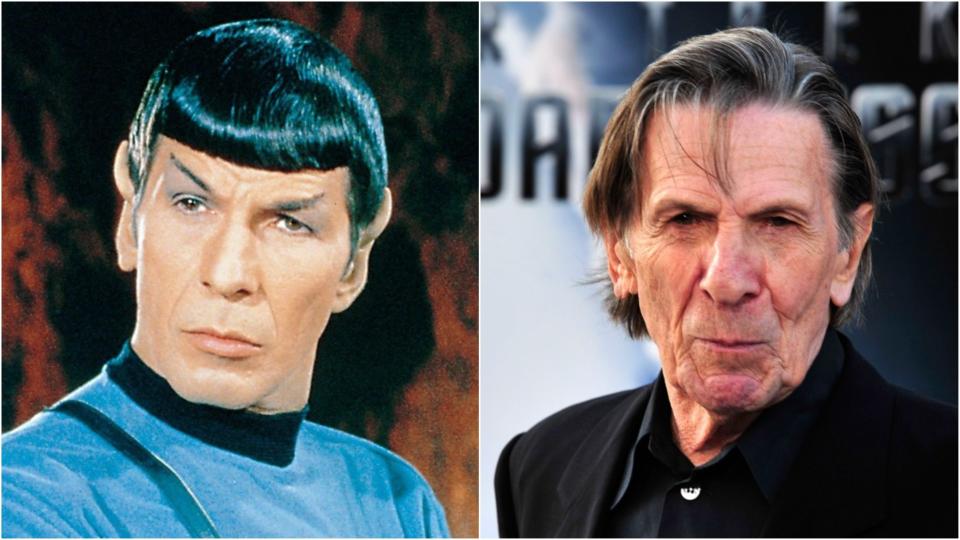
Leonard Nimoy, who would have seemingly been the most typecast from Star Trek having played Mr. Spock, actually went on to the most successful career of all the cast members during the 10-year period between the end of the original series and the release of Star Trek: The Motion Picture.
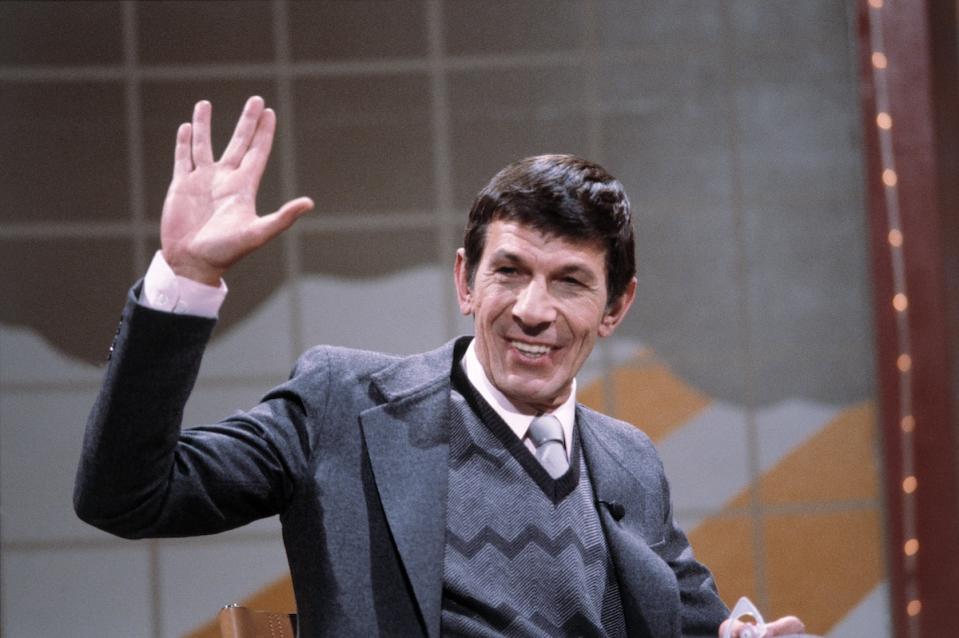
In 1969 he immediately shifted over to a co-starring role in the hit series Mission: Impossible for 49 episodes, playing make-up genius Paris. Following his departure in 1972, he played the lead in the national touring company of the musical Fiddler on the Roof, portrayed another "logical" character in the form of Sherlock Holmes, offered up his take on Vincent Van Gogh in the one-man show Vincent, and starred on Broadway in Equus. He made numerous appearances in episodic series and TV films, and narrated the syndicated show In Search of...
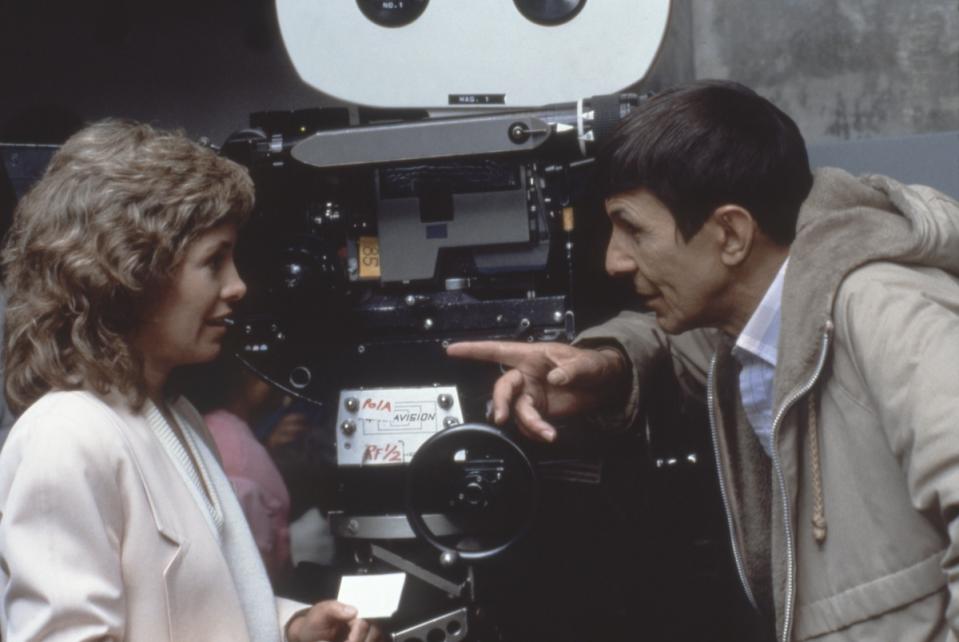
On the big screen he reprised the role of Spock in six films featuring the original cast, and portrayed the character in J.J. Abrams' 2009 reboot as well as the 2013 sequel Star Trek Into Darkness, which would turn out to be his final filmed role. Earlier he segued into directing, doing so for Star Trek III (1984) and Star Trek IV (1986) before taking on Three Men and a Baby (1987), The Good Mother (1988), Funny About Love (1990) and Holy Matrimony (1994).
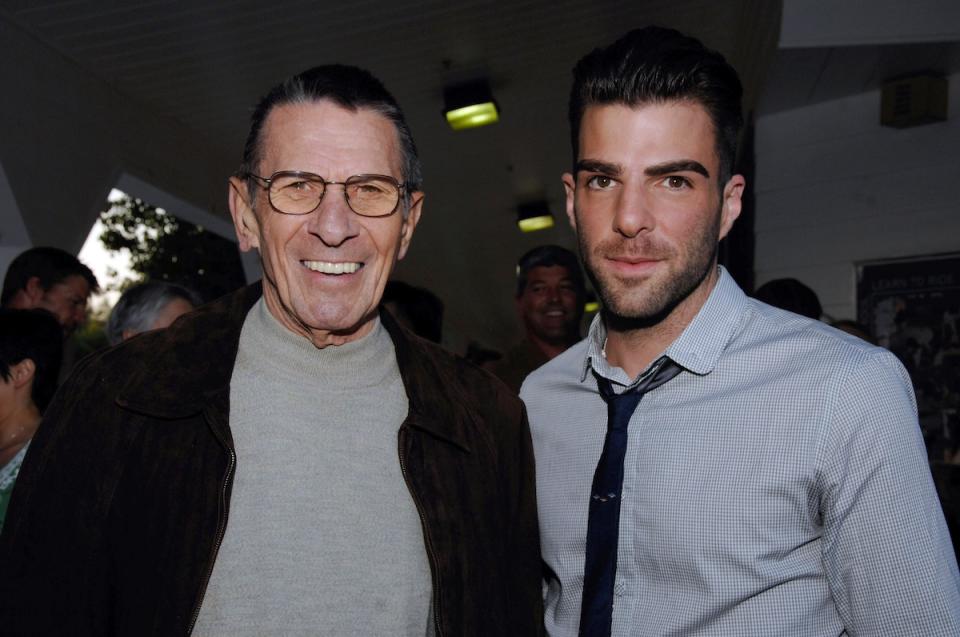
Between 1973 and 2002 he wrote seven books of poetry, two biographies — I Am Not Spock (1975) and I Am Spock (1995) — and published three books of photography. Additionally, he recorded five albums between 1967's Leonard Nimoy Presents Mr. Spock's Music from Outer Space and 1970's The New World of Leonard Nimoy.
Nimoy was married twice and had two children. He died on February 27, 2015 of complications from COPD at the age of 83.
DeForest Kelley as Dr. Leonard "Bones" McCoy
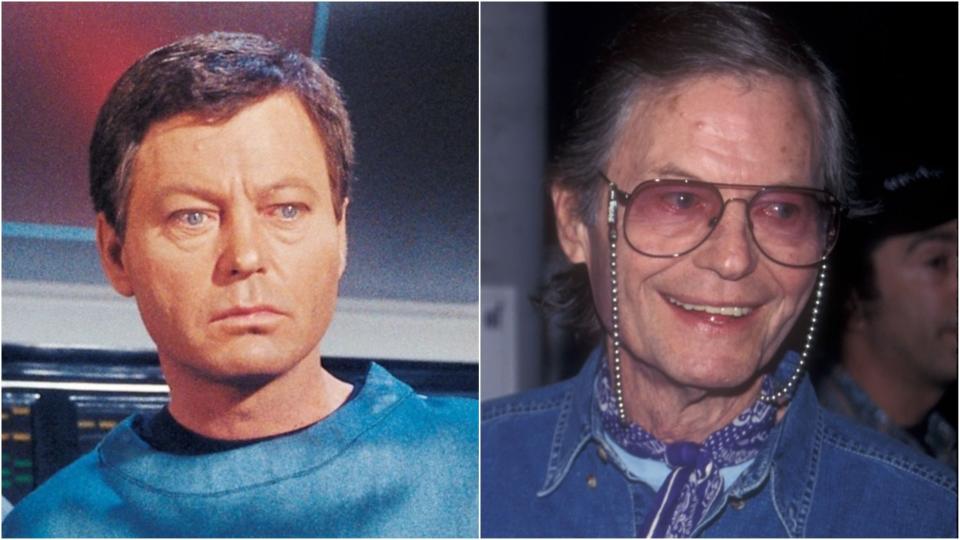
In essence, Dr. Leonard "Bones" McCoy served as the conscience to Captain Kirk aboard the Enterprise, and as such was perhaps the most humanistic of all the characters. There's a bit of irony there in the sense that actor DeForest Kelley built his acting career on playing villains in Western films and TV shows. His post-Star Trek career was fairly limited, starring in the 1972 film Night of the Lepus, about a battle against giant killer bunnies, and he reprised the role of McCoy in six Star Trek features and the first episode of Star Trek: The Next Generation.
He married Carolyn Dowling in 1945 and was with her until his death on June 11, 1999 at age 79 of stomach cancer.
James Doohan as Montgomery 'Scotty' Scott
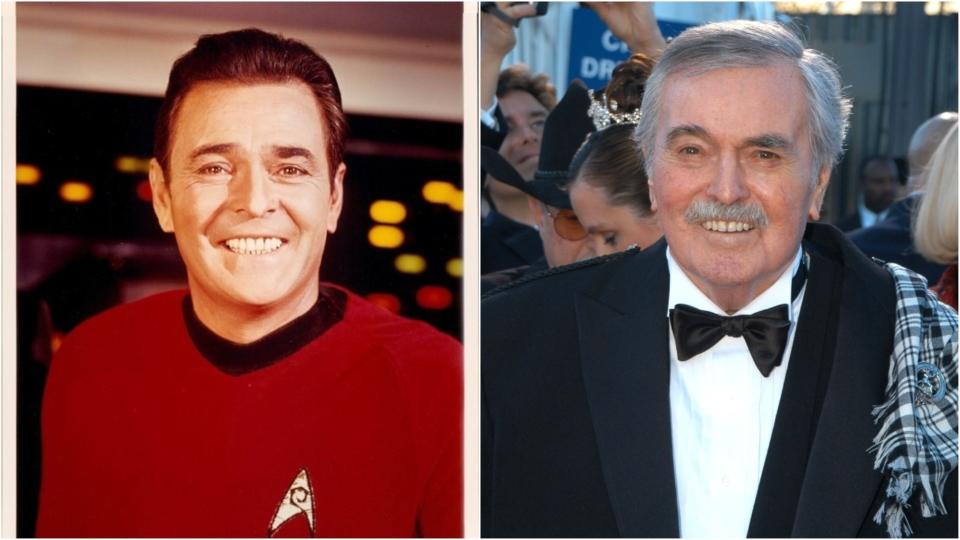
Canadian born James Montgomery Doohan had, by his own estimation, appeared on 4,000 radio programs and 450 television shows before he played Scotty for the first time in the second Star Trek pilot, "Where No Man Has Gone Before." Like his co-stars, he brought the character to the big screen in six feature films, co-starring with Shatner and Walter Koenig in the seventh, Star Trek: Generations; and also appearing in the "Relics" episode of Star Trek: The Next Generation.
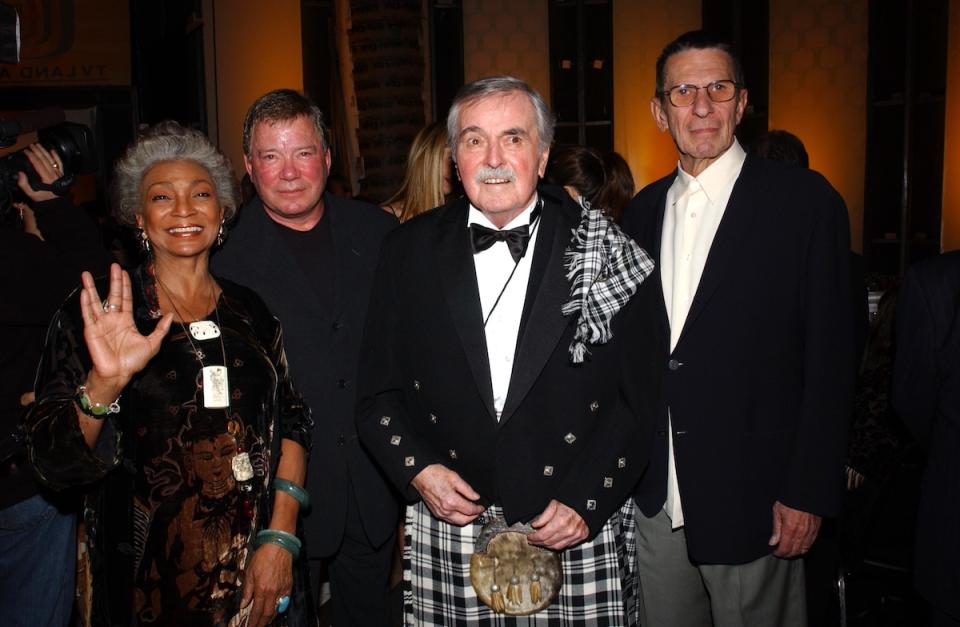
Other film credits include Rock Hudson's Pretty Maids All in a Row and Man in the Wilderness (both 1971), Loaded Weapon 1 (1993) and, in his final film role, Skinwalker: Curse of the Shaman (2005). He co-starred in the Saturday morning live action series Jason of Star Command (1978), and in seven episodes of The Bold and the Beautiful between 1996 and 1997.
Although there were other TV guest spots, he spent much of his time each year doing the convention circuit, which turned out to be fairly lucrative. He wrote his autobiography, Beam Me Up, Scotty: Star Trek's "Scotty" in His Own Words; and three entries in The Flight Engineer book series.
Married three times, he had a total of seven children. He died on July 20, 2005 of complications from pulmonary fibrosis. He was 85.
Nichelle Nichols as Lt. Uhura
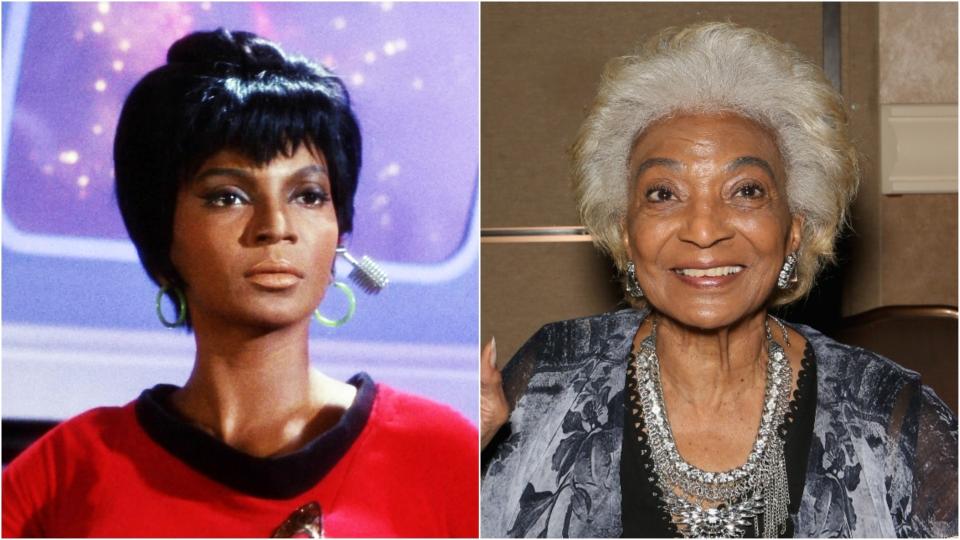
Trying to break through as a black actress in the 1960s was not an easy thing to do, but Nichelle Nichols continued to push, finding small roles in a few films between 1959's Porgy and Bess and 1966's Mister Buddwing.
On TV she could be seen in episodes of Star Trek creator Gene Roddenberry's The Lieutenant, Peyton Place and Tarzan before being hired to play Uhura. Although Nichols was planning on quitting the show after the first season, she was talked out of it by Dr. Martin Luther King, Jr., and remained with the franchise for much of her life. She played Uhura in six films as well as the fan-made production, Star Trek: Of Gods and Men.
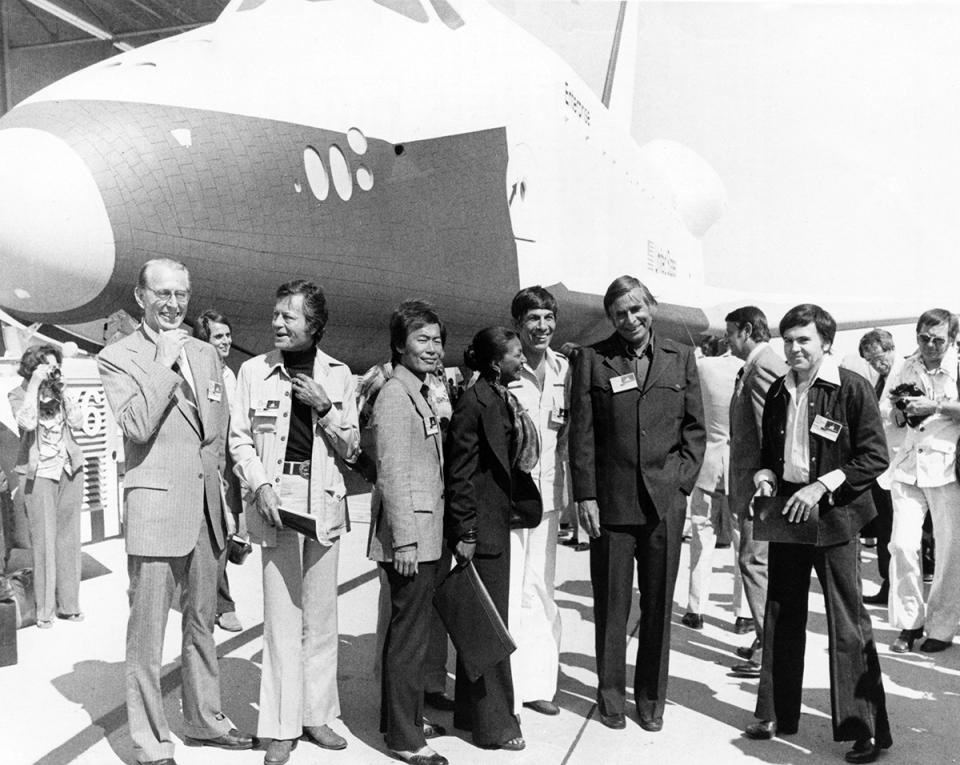
Nichols impact as Uhura was such that NASA worked with her to recruit minority and female personnel for the space agency, her recruitees including the first American female astronaut, Sally Ride; and the first black astronaut, United States Air Force Colonel Guion Bluford. "When I began," the actress pointed out, "NASA had 1,500 applications. Six months later, they had 8,000. I like to think some of those were encouraged by me. The aim was to find qualified people among women and minorities, then to convince them that the opportunity was real and that it also was a duty, because this was historic. I really had this sense of purpose about it myself."
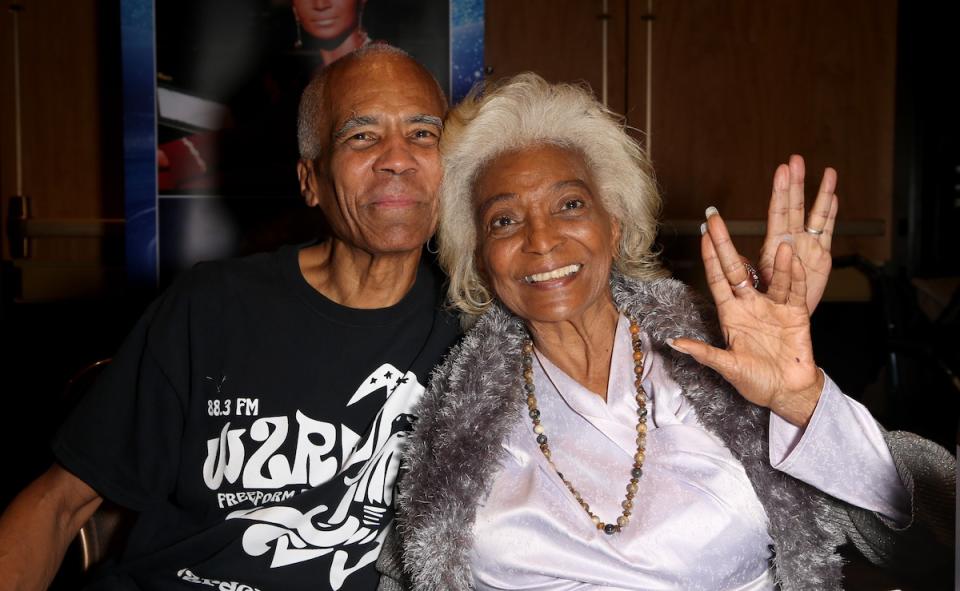
In subsequent years, she provided her voice to a number of TV animated characters, including playing herself on Futurama and The Simpsons; there was a recurring role on Heroes and the soap opera, The Young and the Restless; and film parts in later years included The White Orchid and American Nightmares (both 2018) and Unbelievable!!!!! (2020). Additionally, she recorded three albums, penned her autobiography (Beyond Uhura) and wrote a pair of sci-fi novels, Saturn's Child and Saturna's Quest. Married twice, she has one son (Kyle Johnson). In 2015, Nichols suffered a minor stroke and, three years later, was diagnosed with dementia. She died of heart failure on July 30, 2022 at 89.
George Takei as Sulu
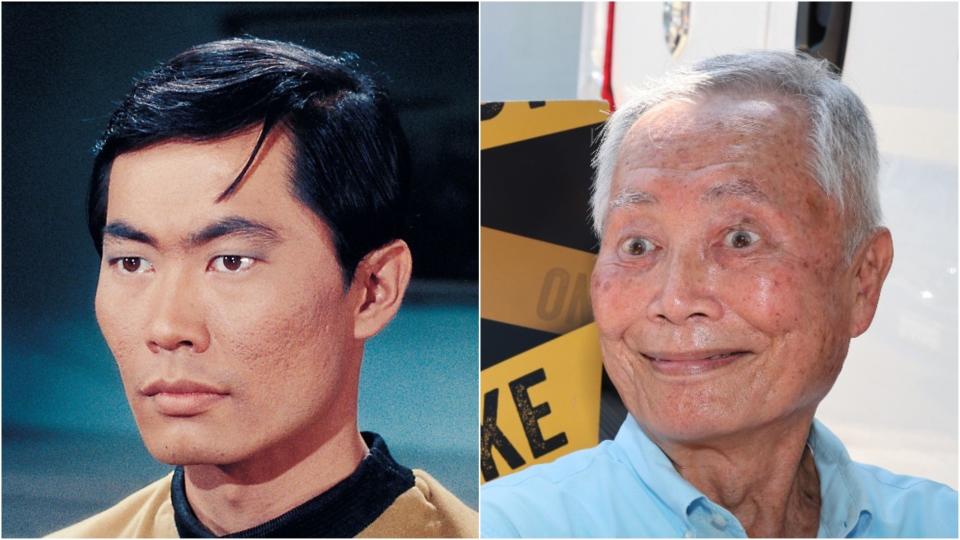
George Takei — born Hosato Takei — certainly diversified following Star Trek. Not only did he make appearances on a variety of television series (including The Six Million Dollar Man, Ironside, Marcus Welby, M.D. and Kung Fu), but he co-wrote the 1979 science fiction/swashbuckler novel Mirror Friend, Mirror Foe and threw his hat into the Los Angeles political arena — and not for the last time.

While Takei has been able to work fairly consistently in film and television — beyond the six Star Trek films he appeared in — he's stayed busy with myriad projects, including the 2012 musical Allegiance, which explores his own experiences and research into the Japanese American internment of World War II.
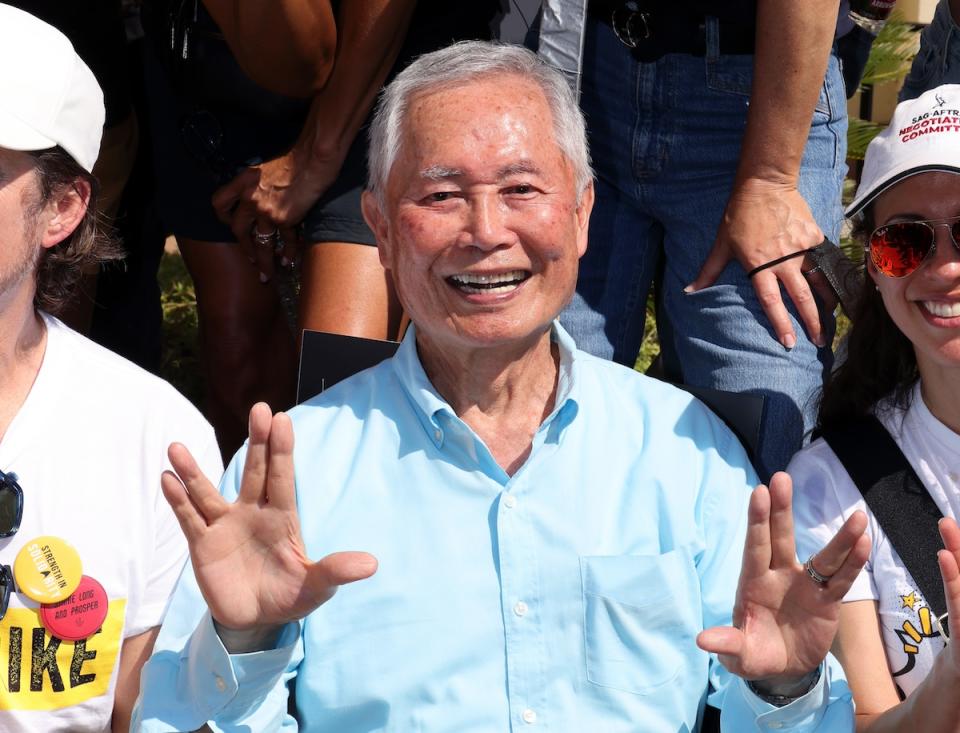
Prior to that, he co-wrote the graphic novel They Called Us Enemy, which focused on his family's internment. In addition, he took on reality shows such as The Apprentice and I'm a Celebrity ... Get Me Out of Here!. He wrote 1994's To the Stars: The Autobiography of George Takei, and followed with two additional non-fiction tomes.
In 2005, he came out as gay and emphasized that he and partner Brad Altman had been, at that point, in a relationship for 18 years (the duo also became the first same-sex married couple in West Hollywood three years later). Since then he has been involved in quite a number of campaigns demanding equal rights for members of the LGBT community.
Walter Koenig as Chekov
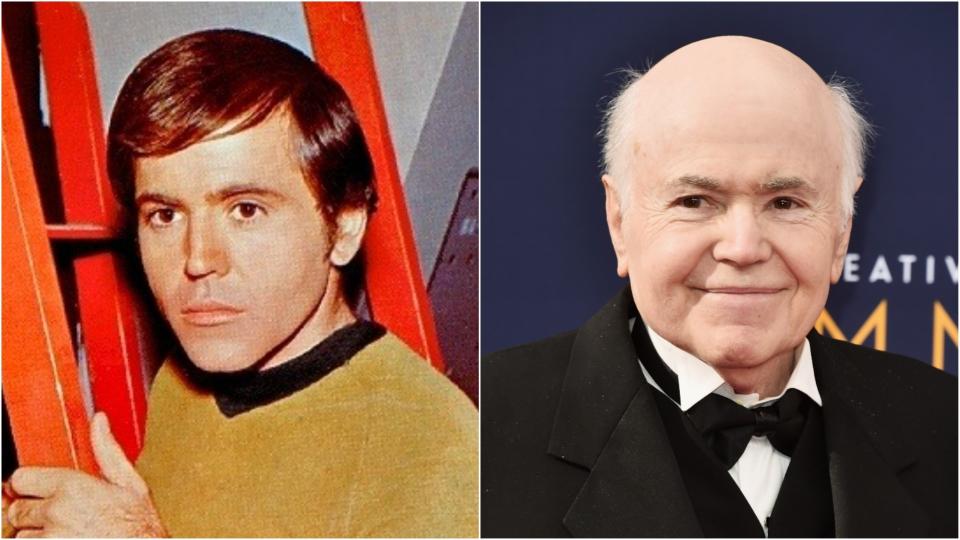
Walter Koenig, like his costars, did his fair share of episodic television work following his two seasons as Chekov in the Star Trek cast, co-starred in the Gene Roddenberry television pilot, The Questor Tapes; had a recurring role on the sci-fi series Babylon 5 and reprised the role of Chekov in seven Star Trek films.
Additionally, he served as an acting teacher, directed plays, wrote novels and penned the scripts for such primetime television fare as Family and What Really Happened to the Class of '65?. On top of that, there are the screenplays for I Wish I May, You're Never Alone When You're a Schizophenic and several one-act plays. His most recent film roles are Who is Martin Danzig? (2018) and Unbelievable!!!!! (2020).
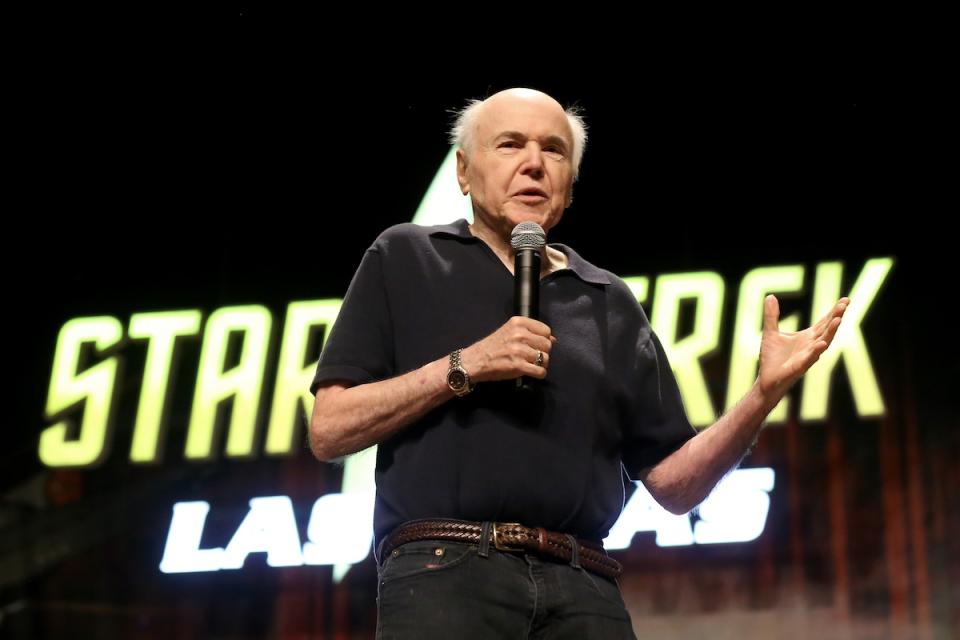
Koenig has written a trio of memoirs (Warped Factors: A Neurotic's Guide to the Universe, Chekov's Enterprise and Beaming Up and Getting Off: Life Before and Beyond Star Trek), the sci-fi novel Buck Alice and the Actor-Rabbit, and the comics Raver and Walter Koenig's Things to Come. He was married to Judy Levitt from 1965 until her death in in 2022. They have two children.
For more 1960s TV nostalgia, keep reading!
‘Three’s Company’ Cast: Behind the Scenes Secrets and Follow the Stars Through Time
‘Gilligan’s Island’ Cast: Surprising Facts About the Stars of the Beloved Castaway Comedy
10 Magical Behind-the-Scenes Facts About ‘I Dream of Jeannie’
